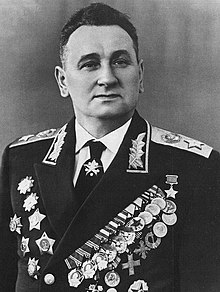
Back Andrey Qreçko Azerbaijani Гречко Андрей Антонович Bashkir Андрэй Антонавіч Грэчка Byelorussian Андрей Гречко Bulgarian Andrei Gretxkó Catalan Andrej Antonovič Grečko Czech Гречко Андрей Антонович CV Andrei Antonowitsch Gretschko German Andréi Grechko Spanish Andrei Gretško Estonian
Andrei Grechko | |
|---|---|
Андрей Гречко | |
 Grechko in 1960 | |
| Minister of Defence of the Soviet Union | |
| In office 12 April 1967 – 26 April 1976 | |
| Premier | Alexei Kosygin |
| Preceded by | Rodion Malinovsky |
| Succeeded by | Dmitriy Ustinov |
| Supreme Commander of Warsaw Pact Armed Forces | |
| In office 1 April 1960 – 12 April 1967 | |
| Preceded by | Ivan Konev |
| Succeeded by | Ivan Yakubovsky |
| Commander-in-Chief of the Soviet Military Administration in Germany | |
| In office 26 May 1953 – 17 November 1957 | |
| Preceded by | Vasily Chuikov |
| Succeeded by | Matvei Zakharov |
| Full member of the 24th Politburo of the Communist Party of the Soviet Union | |
| In office 27 April 1973 – 26 April 1976 | |
| Personal details | |
| Born | Andrei Antonovich Greczhko 4 October 1903 Golodaevka, Don Host Oblast, Russian Empire |
| Died | 26 April 1976 (aged 72) Moscow, Russian SFSR, Soviet Union |
| Resting place | Kremlin Wall Necropolis, Moscow |
| Nationality | |
| Political party | Communist Party of the Soviet Union (1928–1976) |
| Profession | Soldier |
| Awards | Hero of the Soviet Union (twice) |
| Signature |  |
| Military service | |
| Allegiance | |
| Branch/service | Soviet Army |
| Years of service | 1919–1976 |
| Rank | |
| Commands | 18th Army 1st Guards Army Kiev Military District |
| Battles/wars | |
Andrei Antonovich Grechko (Russian: Андре́й Анто́нович Гре́чко, Ukrainian: Андрій Антонович Гречко; 17 October [O.S. 4 October] 1903 – 26 April 1976) was a Soviet military commander and Marshal of the Soviet Union during the Cold War. He served as the Soviet Minister of Defence from 1967 to 1976.
Born to a Ukrainian peasant family near Rostov-on-Don, Grechko served in the Red Army cavalry during the Russian Civil War. After graduating from the Frunze Military Academy, he took part in the Soviet invasion of Poland in 1939. Grechko was a fresh graduate of the Voroshilov Military Academy when Axis forces invaded the Soviet Union. He held a succession of cavalry and army commands afterwards and saw action in the Caucasus, Ukraine and Central Europe.
After the war, Grechko commanded the Kiev Military District. In 1953, he was appointed commander-in-chief of Soviet Forces in East Germany, and led the suppression of the East German uprising. In 1955, he was named a Marshal of the Soviet Union. In 1957, he became commander-in-chief of the Soviet Ground Forces, and three years later he also became the commander of the Warsaw Pact forces. In 1967, Grechko was appointed Minister of Defence, and oversaw the subsequent Warsaw Pact invasion of Czechoslovakia and violent border clashes with China. He helped modernize the Soviet Army and was responsible for continuing the Soviet hegemony over Eastern Europe. An ideological hardliner, he was a defender of the first strike nuclear strategy, and only reluctantly supported Leonid Brezhnev's détente with the United States and the Strategic Arms Limitation Talks (SALT). Grechko died in 1976 at the age of 72.
© MMXXIII Rich X Search. We shall prevail. All rights reserved. Rich X Search